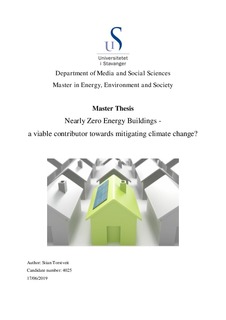| dc.contributor.advisor | Langhelle, Oluf | |
| dc.contributor.author | Torstveit, Stian | |
| dc.coverage.spatial | Norway | nb_NO |
| dc.date.accessioned | 2019-10-13T16:40:14Z | |
| dc.date.available | 2019-10-13T16:40:14Z | |
| dc.date.issued | 2019-06 | |
| dc.identifier.uri | http://hdl.handle.net/11250/2621779 | |
| dc.description | Master's thesis in Energy, Environment and Society | nb_NO |
| dc.description.abstract | This master thesis investigates the potential for the nearly zero energy building concept to make any contribution towards mitigating climate change, as a result of the European Unions ́ “Energy performance of buildings directive” from 2010, requiring that all new buildings must be nearly zero energy buildings as of 31 December 2020, as a means to decrease energy consumption and increase renewable energy production.
Based on the research question proposed together with supportive sub-questions, a deductive and qualitative methodological approach was applied to the case studies of two nearly zero energy building projects in Jampankaari and Kuopio, Finland, in order to either validate or dismiss assumptions regarding the nearly zero energy building concept on the matter of mitigating climate change – that the nearly zero energy building concept will be an important contributor towards mitigating climate change.
Findings throughout the research of this master thesis, showcased evidence that nearly zero energy buildings as a concept stand in stark contrast to the fossil-fuel based electricity production and subsequent anthropogenic climate change witnessed today.
The core of the concept is that the nearly zero energy required should be covered to a very significant degree by energy from renewable energy resources, including renewable energy produced on-site or nearby. Taking into consideration that the cost for energy efficient buildings has decreased in recent years due to the reduction in cost of solar panel production, together with the possibility to sell excess electricity produced back to the utility grid, nearly zero energy buildings will in the long run also become cost-efficient.
Through the research, findings and discussions of this master thesis, it becomes evident that nearly zero energy buildings as a concept is a highly potent contributor towards mitigation climate change. The conclusion though, is that it will not be a major contributor at this point of time. | nb_NO |
| dc.language.iso | eng | nb_NO |
| dc.publisher | University of Stavanger, Norway | nb_NO |
| dc.relation.ispartofseries | Masteroppgave/UIS-SV-IMS/2019; | |
| dc.subject | nullutslippsbygg | nb_NO |
| dc.subject | energi | nb_NO |
| dc.subject | miljø | nb_NO |
| dc.subject | nzeb | nb_NO |
| dc.subject | climate change | nb_NO |
| dc.subject | klimaendringer | nb_NO |
| dc.title | Nearly Zero Energy Buildings - a viable contributor towards mitigating climate change? | nb_NO |
| dc.type | Master thesis | nb_NO |
| dc.subject.nsi | VDP::Technology: 500::Environmental engineering: 610 | nb_NO |
| dc.subject.nsi | VDP::Social science: 200 | nb_NO |
